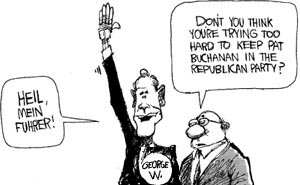
David Corn
http://www.jewishworldreview.com -- PAT BUCHANAN was on a national syndicated call-in radio show last week, promoting his new foreign policy book in which he defends so-called “enlightened” isolationism (and the suggestion that the United States would have been better off had Western Europe not opposed Hitler in the run-up to World War II), when a Florida listener named John Anderson got through.
“The John Anderson?” Buchanan asked.
Yes, the caller said, confirming he was indeed the last Republican presidential candidate who bolted from the party to run as a non-Republican. He then blasted Buchanan’s anti-internationalist foreign policy views.
In 1980 Anderson, a liberal/moderate Republican congressman from Illinois, left the GOP in the middle of the primaries when it became obvious that the party was going to crown conservative champion Ronald Reagan as its nominee. His followers waged petition campaigns across the country and placed Anderson on the presidential ballot in every state.
He participated in the debates with President Carter and Reagan and collected seven percent of the vote. In the years since then, he’s been an elder statesman among those aiming to break up the national political duopoly.
But Anderson doesn’t see Buchanan as the hammer to smash that system.
These days—when he is not teaching at Nova Southeastern Law School in Fort Lauderdale and fulfilling his duties as president of the World Federalist Association—Anderson is working to steer the Reform Party away from Buchanan. “As much as I want to see the present power structure challenged,” he tells me, “it can’t be with Buchanan with his absolutely misbegotten views.” (Anderson is an advocate of an international rule of law; Buchanan’s most chilling nightmare is world government that impinges upon American prerogatives.) Since the Buchanan flurry began, Anderson has repeatedly spoken with Lowell Weicker, the former Republican senator and former independent governor of Connecticut, urging Weicker to try for the Reform Party presidential slot. “You can’t stop Buchanan with nothing,” Anderson says. He reports that Weicker would like to have the nomination but isn’t yet committed to putting in the time, energy and resources required.
It would be an arduous task for Weicker, or any other Buchanan foe. The Reform Party will only automatically qualify for the presidential ballot line in 21 states. The nominee must do the work necessary to make the ballot in the other states. “It’s a little bit daunting,” says Anderson.
“You have to have someone in each state to coordinate a petition drive effort. It takes a lot of sweat-equity. You can pay for that. But it would be pretty expensive.”
Weicker can’t match Buchanan in this organizational regard. How many troops does he have? Anderson acknowledges this: “Weicker’s base is Connecticut, and that’s a small state.” And he’s not all that popular there. Moreover, Weicker’s name recognition is high only among the most insomniac C-SPAN junkies. Surely, the stop-Pat movement needs someone with more firepower. What about Jesse Ventura’s effort to recruit Donald Trump for a thwart-Pat candidacy? “I see them faltering and going down this ridiculous path of putting out the Trump trial balloon,” Anderson says. And regarding a Trump candidacy, Anderson won’t jump on that circus train: “Trump is obviously a man bent only on
 |
The 2000 election presents “a golden opportunity for a third party to emerge and be credible and give the Democrats and Republicans some competition,” notes Anderson. Yet the Buchanan raid on the Reform Party—and the Trump talk—threatens to trivialize or marginalize the third-party movement. It’s time for the Reform Party to shove Ross Perot off the stage and, in a sense, grow up. Buchanan and Trump do not represent political maturity.
Anderson is a wishful thinker, something of a yesterday-politician, but a noble one. He has no clout within the Reform Party, just respect in certain of its quarters. Yet his wish to stop Pat is shared by a portion of Reform Party members (but not the Perot wing) and by nonmembers who would like to see more political choices, but not the choice represented by Buchanan. All their opposition will mean nothing if they cannot find a brawny Buchanan-buster. Anderson realizes that Weicker is not well equipped to slay Pat the Nativist Dragon.
But Anderson (like the other
anti-Buchananites) can’t think of any other serious contender to send
into battle: “I don’t know who that person could be,” he notes with a
sigh. “If there’s someone out there, I wish they’d let me
JWR contributor David Corn, Washington Editor of The
Nation, writes the "Loyal Opposition" column for The New York Press.


